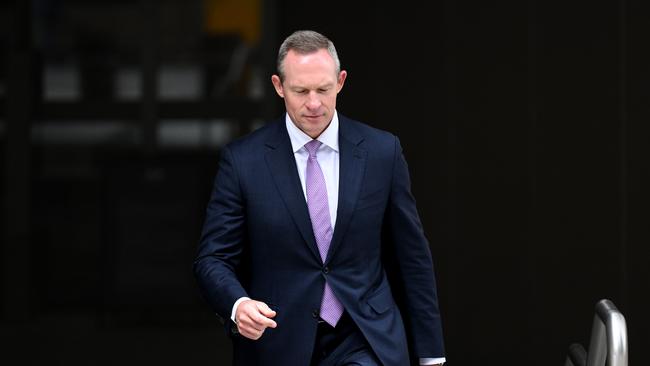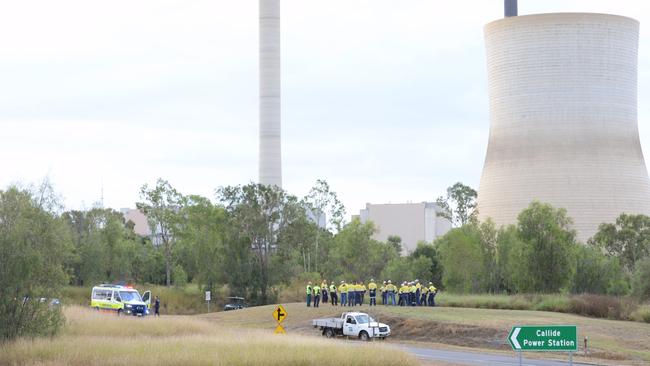‘Catastrophic risk’: Callide Power Station safety warnings ignored
An outgoing safety officer warned the Callide Power Station was headed for “catastrophic risk” years prior to an explosion and cooling tower collapse that left half a million without power.
QLD Votes
Don't miss out on the headlines from QLD Votes. Followed categories will be added to My News.
A Callide power station safety manager who quit after her funding was cut, warned her superiors on her way out the door that the plant “was on path for catastrophic risk” at least two years prior to separate incidents that cut power to about 500,000 Queenslanders.
But Energy Minister Mick de Brenni told the Federal Court he was unaware of this warning and others like it, as well as the associated backlog in safety inspections and maintenance work at the power station until the Brady Report was released earlier this year.
During his almost 90 minutes on the stand on Thursday, Mr de Brenni said he personally inspected the damage with executives from state-owned company CS Energy - which manages Callide - immediately after the C4 explosion and C3 cooling tower collapse.
But when pressed on what questions he asked during these visits, Mr de Brenni said either maintenance and safety were not discussed in detail, or former CS Energy CEO Andrew Bills assured him “everything that had been required, had been done”.

The C4 explosion at Callide Power Station, about 150km south of Rockhampton, occurred in May 2021, while the cooling tower collapse in the C3 unit happened in October 2022.
Mr de Brenni was summoned last month to appear in the Federal Court in Brisbane by FTI Consulting – the appointed administrators of IG Power, CS Energy’s joint-venture partner for the Callide Power Station. The case is investigating the cause of the C3 and C4 incidents.
Mr de Brenni took over the state’s energy portfolio in November 2020, his predecessor was Dr Anthony Lynham, who had overseen the portfolio since 12 Dec 2017.
The court heard that Callide C full maintenance overhauls were meant to be conducted every two-and-a-half years and any identified repairs carried out.
When asked if he knew whether this schedule had been met, Mr de Brenni said he was “only able to rely on the advice provided” to him.
The court then heard that the C3 and C4 cooling towers had not been inspected since at least 2014.
“I’m aware of the difficulties in those parts,” Mr de Brenni responded.
In 2021, independent contractors had reported serious concerns about structural issues related to the cooling towers.
“That had not been brought to my attention,” Mr de Brenni told the Federal Court.
Mr de Brenni was asked whether he discussed safety and maintenance with Mr Bills during his visit following the May 2021 Callide C4 explosion.
“I inquired of Mr Bills … how an incident like that could have occurred … [he] assured me everything that had been required had been done … but process safety was not part of that conversation,” the Minister answered.
“Mr Bills advised me that it was an ‘unforeseeable incident’.”
When discussing the aftermath of the C3 cooling tower collapse, Mr de Brenni said Mr Bills assured him during his visit “there would be an investigation into the cause of the collapse”.
When asked he was aware of a “mini failure” that had occurred prior to the full collapse, Mr de Brenni conceded: “I don’t think I was made aware of that specifically.”

The funding for Callide’s crucial ‘process safety team’ and its ‘critical risk program’ was cut at the start of 2019. Dr Lynham was Energy Minister at this time.
As a result, this created the risk that the plant’s process safety team would be dissolved entirely. Callide’s process safety manager and her second-in-charge soon resigned.
Mr de Brenni said he was not made aware of the rejected safety funding request and the risk it created when he took over at the end of that year.
In her exit interview, Callide’s process safety manager raised multiple concerns – such as delayed maintenance schedules – and warned “a process safety incident was possible”.
Mr de Brenni said he was not aware of this until highlighted in the Brady Report this year.
These two resignations effectively meant there was no process safety management team at Callide from April 2019 to July 2020.
Again, Mr de Brenni testified he read this for the first time in the Brady Report.
In a further exit interview – the contents of which were passed on to Mr Bills, who said in internal documents that he would investigate further – the safety manager expressed concerns that “Callide was on a path for catastrophic risk”.
“I only became aware of this upon receiving the material in the [Brady] Report,” Mr de Brenni told the Federal Court.
However, Mr de Brenni did emphasise that the Department of Energy had gone back through the records and confirmed that any and all requests for “extra funding” from Callide had been approved by either Mr de Brenni or Dr Lynham.
“Those requests are made through the annual budget process through the Treasury. I’m advised those for maintenance had all been approved,” Mr de Brenni said.
The Brady Report identified a significant maintenance backlog in 2019, which was not addressed and completed until 2022.
“There were no specific concerns raised with me,” Mr de Brenni told the Federal Court, when asked if he was made aware of this when he took over.
Outside court, Mr de Brenni said he had “full confidence in the new CS Energy board and its leadership” but would not take personal responsibility for the Callide catastrophes.
“What I’ve taken responsibility for is to ensure that Queenslanders have a reliable, low-cost, and affordable power system,” he said.
“Queenslanders can rest assured that they have the most reliable power system in the country, and that’s the advice of independent regulators. Queenslanders also have the lowest and most affordable power prices in the country as well.”
Mr de Brenni was not concerned his Federal Court appearance would have an impact on the October 26 election, and added that he had been “consistent” in his responses around what he did and did not know regarding the Callide incidents.



